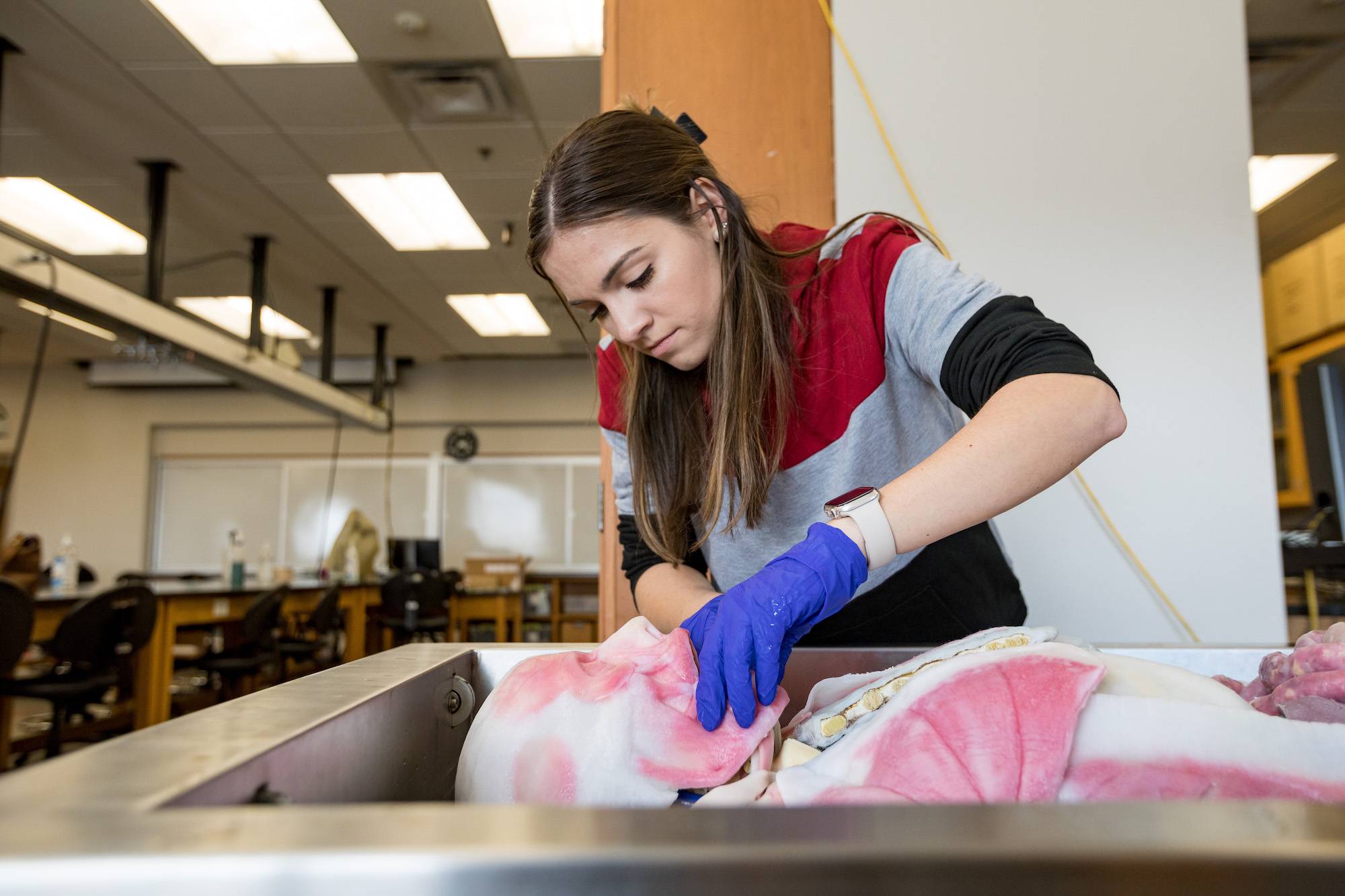Baccalaureate Degrees in Biology
The Department offers four undergraduate majors – in biology (2), medical laboratory science, and molecular biotechnology – each of which leads to a B.S. degree. We also offer a minor in biology. All of our degree programs offer the opportunity to work alongside faculty and staff in research and are focused on preparing you for what comes next, be it a career, graduate or professional school. Click on the links below to explore our different programs and find the one that is right for you!

Biology, Bachelor of Science
The major in Biology (525) provides students the opportunity to undertake an in-depth study of biological sciences and its applications. A minor, second major, or certificate is not required. The major in Biology begins with foundation classes and laboratories that build into a core of advanced courses and laboratories. In addition to a required core, students complete a range of biology elective courses tailored to their interests to support their career goals. The students can also apply up to six credit hours of faculty-guided independent research and/or an internship experience toward their degree program.
The program offers six different concentrations - Applied Genetics (BIAG), Applied Microbiology (BIMI), Animal Physiology & Behavior (BIAP), Ecology, Wildlife, & Conservation (BIWC), Integrative Biology (BIIB), and Pre-Medical Professions (BIPM). These six concentrations are designed to facilitate essential requirements and provide training for a variety of career pathways and advanced degree programs to suit student interests.
The major in Biology (Reference Number 617) provides an opportunity to acquire broad-based study in biology for students who wish to be certified to teach high school biology. These students must complete both the major in Biology (617) with a teacher education certification (TCHR) and the major in Science and Mathematics Education (reference number 774). Interested students should contact the SKyTeach Office, Kelly Thompson Hall 1011A, 270-745-3900 or visit www.wku.edu/skyteach.
In addition to coursework, students may apply up to three credit hours of faculty-guided independent research and/or an internship experience towards their degree.
Medical Laboratory Science, Bachelor of Science
With the aging of our population, it is estimated that health care will be a major service industry in our country. An important part of health care is Medical Laboratory Science, formally known as Medical Technology, a profession that includes well-trained, highly educated individuals who are the fact-finders of the medical world. Medical Laboratory Scientists typically analyze body fluids, examine tissues, and identify specific microorganisms to find evidence for and the cause of specific diseases such as AIDS, Diabetes, and Cancer. Some of the exciting new demands of the profession include tissue typing for organ transplantation, chromosomal studies as a basis for genetic counseling, identification of environmental pollutants, and screening tests for accidental poisoning and drug abuse. The demand for graduates in this field is very high. The U.S. Bureau of Labor Statistics continues to project a need for new Medical Laboratory Scientists to meet medical demands of an aging population.
The Medical Laboratory Science program combines a minimum of three years (96 semester hours) of college courses at Western Kentucky University with a minimum of 12 calendar months (36 semester hours) of satisfactory clinical training in a school of Medical Laboratory Science (Medical Technology). The program is affiliated with the following schools of medical technology: Bellarmine University, Louisville, KY; Owensboro Medical Health System, Owensboro, KY; Vanderbilt Medical Center, Nashville, TN; and St. Elizabeth Medical Center, Covington, KY.
Molecular Biotechnology, Bachelor of Science
A Notice to Molecular Biotechnology Students – Past, Present, & Future
Effective Fall 2026, the Department of Biological Sciences will be suspending the B.S. Program in Molecular Biotechnology and recasting it as a curricular concentration within our B.S. in Biology Program. Any students already enrolled in the MB major will have the option to either (1) complete the program as originally planned, or (3) change their major to Biology with a concentration in Molecular Biotechnology. All MB-related courses will continue to be offered, and the knowledge and skills gained through the MB concentration will be the same as in the current major; however, the total credits required will be reduced from 84 to 54. If you have questions, please reach out to your faculty advisor or email biology@wku.edu.
Biology, Minor
The minor in biology (326) provides an opportunity for students to couple training in their primary discipline with an understanding of the foundational concepts, theories, patterns, and processes in the biological sciences. Beyond the core, the biology minor is flexible, allowing students to tailor their coursework to their primary areas of interest.
Secondary Teaching Certification in Biology
Students who wish to be certified to teach high school biology must complete both the major in Biology (reference number 617) with a teacher education certification (TCHR), and the major in Science and Mathematics Education (reference number 774). Interested students should contact the SKyTeach Office, Kelly Thompson Hall 1011A, 270-745-3900 or visit www.wku.edu/skyteach.
Biology Department Scholarships
Phone: (270) 745-3696
Fax: (270) 745-6856
- biology@wku.edu
1906 College Heights Blvd, #11080
Bowling Green, KY 42101-1080
Some of the links on this page may require additional software to view.

